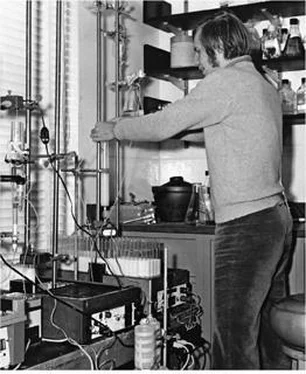James Watson - AVOID BORING PEOPLE - Lessons from a Life in Science
Здесь есть возможность читать онлайн «James Watson - AVOID BORING PEOPLE - Lessons from a Life in Science» весь текст электронной книги совершенно бесплатно (целиком полную версию без сокращений). В некоторых случаях можно слушать аудио, скачать через торрент в формате fb2 и присутствует краткое содержание. Жанр: Биографии и Мемуары. Описание произведения, (предисловие) а так же отзывы посетителей доступны на портале библиотеки ЛибКат.
- Название:AVOID BORING PEOPLE: Lessons from a Life in Science
- Автор:
- Жанр:
- Год:неизвестен
- ISBN:нет данных
- Рейтинг книги:5 / 5. Голосов: 1
-
Избранное:Добавить в избранное
- Отзывы:
-
Ваша оценка:
- 100
- 1
- 2
- 3
- 4
- 5
AVOID BORING PEOPLE: Lessons from a Life in Science: краткое содержание, описание и аннотация
Предлагаем к чтению аннотацию, описание, краткое содержание или предисловие (зависит от того, что написал сам автор книги «AVOID BORING PEOPLE: Lessons from a Life in Science»). Если вы не нашли необходимую информацию о книге — напишите в комментариях, мы постараемся отыскать её.
AVOID BORING PEOPLE: Lessons from a Life in Science — читать онлайн бесплатно полную книгу (весь текст) целиком
Ниже представлен текст книги, разбитый по страницам. Система сохранения места последней прочитанной страницы, позволяет с удобством читать онлайн бесплатно книгу «AVOID BORING PEOPLE: Lessons from a Life in Science», без необходимости каждый раз заново искать на чём Вы остановились. Поставьте закладку, и сможете в любой момент перейти на страницу, на которой закончили чтение.
Интервал:
Закладка:
I played his ghost in 1948, but when Max Delbriick was present he took care of the phage graduation party himself. Here he is, standing, with a flotation device around his neck and his hand on a bottle of beer.
Frequently on the tennis court in front of Jones Lab was the physicai
anthropologist William H. Sheldon hitting with his much, much younger third wife. Sheldon, connected to the College of Physicians and Surgeons of Columbia University, was putting finishing touches on his about-to-be-published book Variations of Delinquent Youth. He also was at work on his newest opus, an Atlas of Men, and he gave a Thursday evening lecture about it in late July. He presented his thesis that human bodies should be viewed as composites of three qualities, ectomorphy (linearness), mesomorphy (muscle), and endomorphy (roundness), each derived from a different embryonic germ layer. The proportion of different tissue types dictated not only somatotype (kind of body) but also individual temperament. The lecture, profusely illustrated with photos of nude men, might easily have been regarded as a front for deviant sexuality but for the laughable extremes that predominated: torturously thin ectomorphs as well as an equal number of blubbery endomorphs. By Sheldon's scheme, which assigned numerical values to indicate proportion of tissue types, the ideal bodies were designated 3-4-3 physiques, derived from all three germ layers with a modest excess of muscles. Luria was not in the audience, not wanting to dignify Sheldon's obvious crap. Afterward Sheldon let me know I was a 6-1-1, an ectomorph having only minimal muscles to accompany my skin and nervous system. He did not mention the part of his theory holding that, overall, ectomorphs were relatively likelier to wind up in mental institutions.Equally off the wall was the talk the following Thursday by Richard Roberts, who drove up from Washington, where he was a senior member of the Department of Terrestrial Magnetism of the Carnegie Institution. To our dismay, he had walked into Blackford with a golf bag, evidently prepared to spend much of his visit on the nearby links. A Princeton-trained nuclear physicist, in 1939 he made measurements on the number of neutrons released during uranium fission, data that were crucial to the development of the atom bomb. For this vital war research, he later received the Medal of Merit from President Truman. Wanting afterward to move into biology, Roberts had taken the 1947 phage course, whose students also included Leo Szilard and Philip Morrison, a former student of Robert Oppenheimer, who had done theoretical calculations for the first atom bomb. To everyone's surprise
Roberts's first foray into biology owed nothing to the phage course of the previous year, since his subject was extrasensory perception. Though Luria again bluntly declared to everyone that he would not dignify junk, curiosity got the better of virtually everyone else at Cold Spring Harbor. The lecture focused on the already highly controversial experiments at Duke University of parapsychologist J. B. Rhine. Soon Roberts was pulling cards out of carefully shuffled decks and predicting their values. Either he or the audience clearly had gone bonkers. At the end of the talk, the Berlin-born insect geneticist Ernst Caspari, drawing on his impeccable Continental politeness, thanked Roberts for his very unique talk.The Delbrücks were then back from Germany, and had taken up residence in the flat on the north side of Hooper House. The lounge at Blackford soon became the Lab's intellectual center, its blackboard covered with thermodynamic equations involving alternative steady states. When in Germany, Max's interest was drawn to the topic through conversations with the noted physical chemist Karl Friedrich Bonhoeffer, his close friend. Karl's brother Klaus had been married to Max's sister, Emmi, before he was killed together with his other brother, Dietrich, a theologian, by the Nazis in 1945. In trying to understand how signals are propagated along nerve fibers, Bonhoeffer had developed equations that Max suspected to be applicable to the sudden changes in surface antigens on paramecia that Tracy Sonneborn was then keenly investigating at IU. Max did not like Sonneborn's own explanation, which postulated heredity determinants in the cytoplasm. Often working with Max to see if Bonhoeffer's equations were actually valid was Günther Stent, free to do as he wished now that the phage course was over. Renato Dulbecco was also brought into action, revealing mathematical abilities not ordinarily associated with an M.D. I would silently watch them bat about equations, knowing I was not up to their mathematical manipulations.
At the end of the phage course, our IU group moved across Bung-town Road to the classroom lab in the Davenport Building that Günther Stent was also making use of for the rest of the summer. My experiments were now even more closely tracking Renato's, studying
progeny phages produced in bacteria simultaneously infected with genetically distinguished active and irradiated inactive phages. Happily, I found that genes from phage parents rendered inactive by X-rays, like those from UV-killed phages, were incorporated into the progeny phages. But whether this gene transfer resulted from a crossing-over process or through an independent assortment of independently replicating genes, as Luria still believed, remained unclear.In mid-August, my parents took the train east for a two-day visit. Dad much liked being with Ernst Mayr and exchanging memories of great birds each had seen. Perhaps that inspired him to splurge and give me a glimpse inside the Moorings Restaurant, whose lofty prices effectively placed it out of bounds for the Lab's scientists. To drink beer or eat clams on the half shell, we normally went farther along the shore to the dependably seedy Neptune's Cave, whose open clam bar on Harbor Road attracted day-trippers out from the city. From Cold Spring Harbor, my parents went on to New Haven, where my father's physicist brother Bill and his family lived near Yale, and where my sister, Betty, was living for the summer.
After the Lurias returned to Indiana, Renato drove Max, Manny, and me to Cape Cod to spend several days at the Marine Biological Lab in Woods Hole. On our way back, I was dropped off at New Haven, where my sister was working at the Winchester Repeating Arms factory. That summer Betty had come from the University of Chicago to be part of a Students in Industry program, under the auspices of the Yale Divinity School, that brought together some ten socially conscious college girls with an equal number of male Chinese students belonging to the Chinese Christian Student Organization. All went well at the large Hillside Avenue residence belonging to the Divinity School until the Chinese students learned they were making rifles destined for the “corrupt” Chiang Kai-Shek in his losing fight against the advancing communist armies. They decided they could not in good faith continue working for the enemy, though they had no qualms about letting the American girls make more rifles to obtain funds needed for the group to remain in New Haven for the rest of the summer.
The week following, Renato and I closed down our Davenport lab, returning our pipettes, test tubes, and water baths to the storeroom for storage until the next summer. Renato's wife and two children were about to arrive by boat from Italy, and soon they would be driving to Bloomington. After a much awaited late August lecture by Ernst Mayr on the “species problem,” the summer effectively came to an end. Of the summer crowd, only the Delbrücks and myself stayed on, taking our meals in the Carnegie dorm basement dining room, which opened up to serve the unmarried residents living in the rooms above. Max and Manny were in no hurry to be back in Pasadena since its hottest days normally occur in the early fall. I had the lucky excuse of needing to stay in the East until mid-September, when I was to meet Luria in Washington at the annual meeting of the Genetic Society. Earlier in the summer, Luria had greatly raised my morale by asking me to give a brief talk concerning my data on X-ray-killed phages to complement the paper he would be giving on his and Renato's latest data.On her way back to Chicago from New Haven, my sister came to Cold Spring Harbor to see how I was living. I soon brought her to the Delbrück flat to meet Max and Manny and see how the phage group operated. She quickly sensed the tight knit of our club, where phages were at center stage and there was little sympathy for those scientists who did boring, if not stupid, experiments on other organisms. My hero worship for Max surprised Betty since his directness and self-confidence were antithetical to my parents’ gentle empathy for those who could not make it to the top. She, moreover, was not at all prepared for Manny's free spirit and her obvious attraction to talented men.
Читать дальшеИнтервал:
Закладка:
Похожие книги на «AVOID BORING PEOPLE: Lessons from a Life in Science»
Представляем Вашему вниманию похожие книги на «AVOID BORING PEOPLE: Lessons from a Life in Science» списком для выбора. Мы отобрали схожую по названию и смыслу литературу в надежде предоставить читателям больше вариантов отыскать новые, интересные, ещё непрочитанные произведения.
Обсуждение, отзывы о книге «AVOID BORING PEOPLE: Lessons from a Life in Science» и просто собственные мнения читателей. Оставьте ваши комментарии, напишите, что Вы думаете о произведении, его смысле или главных героях. Укажите что конкретно понравилось, а что нет, и почему Вы так считаете.












